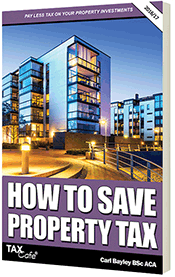Tax Treatment of Rental Losses
Tax Guide from Taxcafe
Hands up anyone making a rental profit these days?
That’s the question I asked a group of investors at a property show recently. To my astonishment quite a few raised their hands.
I was surprised because the question was addressed specifically to people who had purchased property recently… and borrowed money to do it.
How to Save Property Tax
Obviously if you invested in the Olden Days (that’s circa 1980, according to my six year old son) you’ll be making a healthy profit by now – your rents will easily cover your expenses. After all, the average house in London only cost £31,000 back then.
But if you’ve been buying in recent times your rents won’t even cover your mortgage, let alone all your other costs. The probability of making a rental profit is zero. You stand a greater chance of finding a hippy with fresh breath.
Even investors who buy where property is cheap and rental yields are higher – such as in certain towns in Scotland – struggle to make a rental profit these days. I know from first-hand experience.
So why did all those investors raise their hands? I suspect they simply hadn’t completed their tax returns yet. Because when you subtract all your interest charges, letting agent fees, wear and tear, repairs, and all the other tax deductions you’re entitled to as a landlord, the chances of seeing a positive number are non existent.
Unfortunately your rental losses cannot be offset against your salary or other income to reduce your tax bill. They also cannot be offset against your capital gains. Rental losses can only be offset against future rental profits.
The problem is most investors will not make a profit for years and years. In fact many will never make much of a profit, especially if interest rates stay high and rents only rise in dribs and drabs, as they do in most parts of the country.
Those who sell up will then face a cruel predicament – a large capital gains tax bill coupled with a large and worthless rental loss.
However, I suspect most property investors do not intend to sell up. Most eventually plan to pay down their borrowings and use their properties to produce an income (or ‘passive’ income, as those self-help gurus in the States like to call it).
At this point your accumulated rental losses will give your finances a massive boost. If you have tens of thousands of pounds of losses that means you can earn tens of thousands of pounds of tax-free rental income.
That’s why I like to think of rental losses as a form of pension saving for property investors. You may not be able to get your hands on them in the short-term but one day they will come in jolly handy.
Hence I always encourage property investors to claim every single penny of tax deductions to which they’re entitled. Most don’t have any incentive to claim much more than their mortgage interest. However, you have to take a long term view and remember that every extra £1,000 of expenses you claim will lop £400 off your tax bill in the future.
And there are loads of additional expenses you can claim in the right circumstances, including a percentage of your private household bills (mortgage interest, utility bills, council tax, repairs etc), motor expenses, magazines… the list goes on and on. You can even claim certain bills for hotels, flights and restaurants.
One final word of warning. Your rental losses can be carried forward as long as you continue to have a property rental business. If you sell all your properties you will lose your losses. However, as long as you always have at least one UK rental property you will still have a UK property business.






